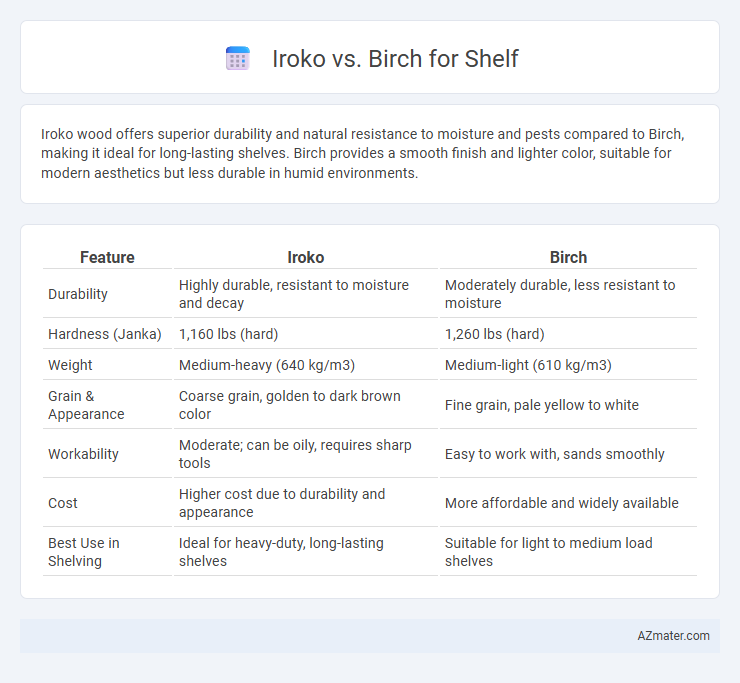Iroko wood offers superior durability and natural resistance to moisture and pests compared to Birch, making it ideal for long-lasting shelves. Birch provides a smooth finish and lighter color, suitable for modern aesthetics but less durable in humid environments.
Table of Comparison
| Feature | Iroko | Birch |
|---|---|---|
| Durability | Highly durable, resistant to moisture and decay | Moderately durable, less resistant to moisture |
| Hardness (Janka) | 1,160 lbs (hard) | 1,260 lbs (hard) |
| Weight | Medium-heavy (640 kg/m3) | Medium-light (610 kg/m3) |
| Grain & Appearance | Coarse grain, golden to dark brown color | Fine grain, pale yellow to white |
| Workability | Moderate; can be oily, requires sharp tools | Easy to work with, sands smoothly |
| Cost | Higher cost due to durability and appearance | More affordable and widely available |
| Best Use in Shelving | Ideal for heavy-duty, long-lasting shelves | Suitable for light to medium load shelves |
Iroko vs Birch: Overview of Wood Types
Iroko wood is a durable hardwood native to West Africa, known for its rich golden to dark brown color and natural resistance to moisture and decay, making it ideal for shelves in humid environments. Birch wood, a lighter pale cream color with a fine grain, comes from temperate regions and offers a smooth finish but is less resistant to moisture and wear compared to Iroko. Choosing between Iroko and Birch for shelving depends on the need for durability and moisture resistance versus a lighter aesthetic and ease of finishing.
Comparing Physical Properties
Iroko wood exhibits superior durability and resistance to moisture compared to birch, making it ideal for shelves in humid environments. Birch is lighter with a fine, even grain, providing a smoother surface but is less dense and more prone to dents and scratches than Iroko. The hardness of Iroko, measured around 1,200 on the Janka scale, significantly surpasses birch's rating of approximately 1,260, offering enhanced strength and longevity for shelving applications.
Durability and Longevity
Iroko wood offers superior durability and longevity for shelves due to its natural resistance to rot, insects, and moisture, making it ideal for humid environments. Birch, while strong and visually appealing with a smooth finish, is less resistant to water damage and tends to wear faster under heavy loads or constant use. Choosing Iroko ensures extended shelf lifespan and minimal maintenance compared to Birch, especially in demanding conditions.
Appearance and Aesthetics
Iroko wood features a rich golden to medium brown hue with a coarse grain pattern that darkens with age, offering a warm and exotic aesthetic ideal for statement shelving. Birch wood displays a pale cream to light brown color with a fine, uniform grain, delivering a clean and modern look that brightens interior spaces. Both woods provide distinct visual appeal, with Iroko's natural oils enhancing its sheen and durability, while Birch's smooth texture allows for versatile staining and finishing options.
Workability for Shelving
Iroko offers excellent workability for shelving due to its medium density and straight grain, allowing smooth cutting and shaping without excessive wear on tools. Birch features a fine, uniform texture and is relatively easy to machine, making it suitable for precise joinery and sanding in shelving projects. Both woods hold screws well, but birch tends to warp less, providing stable dimensional accuracy for shelves over time.
Strength and Load Capacity
Iroko wood offers superior strength and load capacity compared to birch, making it ideal for heavy-duty shelves requiring high durability. Its dense grain structure ensures resistance to warping and sagging under substantial weight. Birch, while strong and fine-grained, generally supports less load, making it better suited for decorative or lighter shelving applications.
Resistance to Moisture and Decay
Iroko wood offers superior resistance to moisture and decay due to its natural oils and dense grain structure, making it ideal for shelves in humid environments. Birch, while aesthetically pleasing with a smooth and light finish, is more prone to absorbing moisture and developing rot if not properly sealed. For long-term durability and low maintenance in damp areas, Iroko remains the preferred choice among hardwoods.
Cost and Availability
Iroko shelves typically cost more than birch due to their durability and tropical hardwood status, but their price reflects long-lasting wear resistance. Birch is widely available and more affordable, making it a popular choice for budget-conscious projects with moderate usage needs. Availability of Iroko can be limited outside specialized lumber suppliers, whereas birch is commonly stocked in most hardware and lumber stores.
Environmental Impact and Sustainability
Iroko wood is highly durable and resistant to decay, requiring less frequent replacement, which reduces long-term environmental impact compared to birch. Birch is a fast-growing hardwood that supports sustainable forestry due to its rapid replenishment rates, helping to maintain forest ecosystems. While iroko offers longevity, birch's renewability and lower carbon footprint during cultivation make it a more sustainable choice for environmentally conscious shelving projects.
Best Choice for Different Shelf Applications
Iroko wood offers exceptional durability and moisture resistance, making it ideal for outdoor shelves or wet environments, while Birch provides a smooth texture and uniform grain perfect for indoor shelving and aesthetic-focused applications. Iroko's natural oils enhance resistance to decay, benefiting heavy-duty storage in humid conditions, whereas Birch's light color and fine grain adapt well to painted or stained finishes for decorative shelves. Choosing between Iroko and Birch depends on environmental exposure and desired shelf appearance, with Iroko suited for rugged use and Birch excelling in stylish, controlled settings.

Infographic: Iroko vs Birch for Shelf
 azmater.com
azmater.com